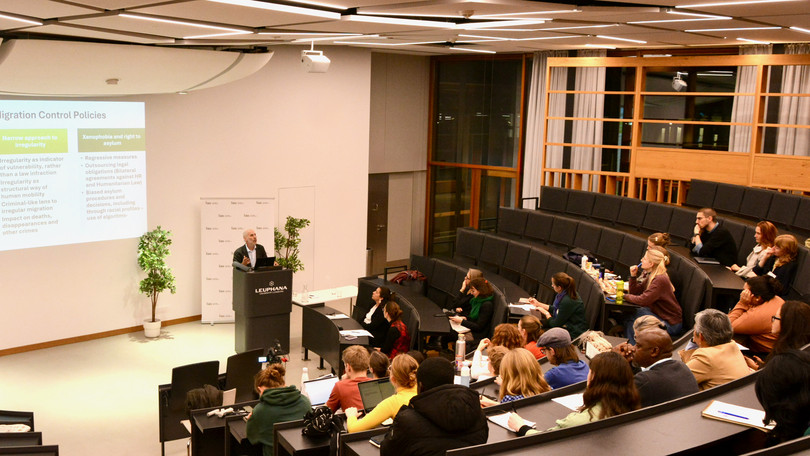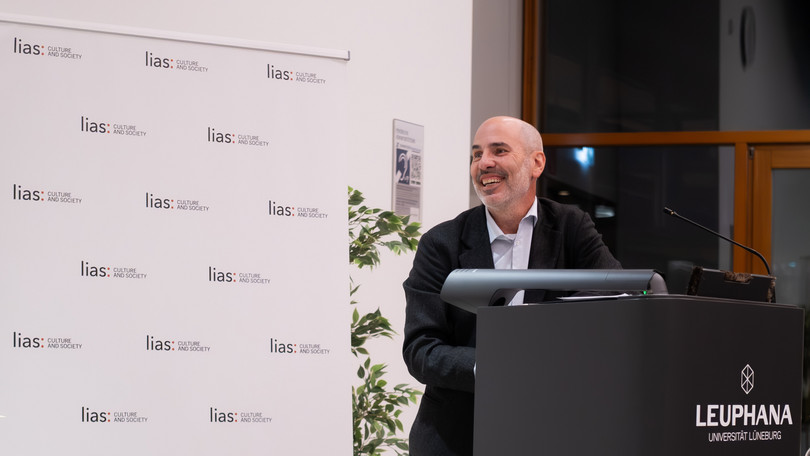LIAS Lecture: New UN Guideline on Polarization and Migration-Related Xenophobia
Follow-up report on the LIAS lecture by Pablo Ceriani Cernadas
2025-11-14 In December 2025, the United Nations will publish new, comprehensively revised guidelines for combating xenophobia (hostility towards foreigners) – a milestone that could hardly be more timely given the growing political polarization and migration-related hostility around the world. This was the starting point for Pablo Ceriani Cernadas in his LIAS Lecture "New UN Guidelines on Politics for Eradicating Xenophobia".
Ceriani is co-coordinator of the working group of the UN committees Committee on the Elimination of Racial Discrimination (CERD) and UN Committee on the Protection of the Rights of All Migrant Workers and their Families (CMW). The Argentine lawyer, and expert on human rights and the UN believes that xenophobia is no longer merely just a marginal social phenomenon, but has become a systemic driver of discriminatory policies. Political narratives – often characterised by fear, distortions and misinformation – are increasingly shaping legislation and administrative practice: “Discrimination is immediately noticeable for those affected in their everyday lives,”, said Ceriani," with respect to access to education, health, work, housing and, last but not least, in migration policy procedures." And he made it clear: From a human rights perspective, this trend jeopardizes the principle of non-discrimination and represents one of the greatest challenges for the setting of international standard-setting.
The new guidelines of the CERD and CMW committees, which are based on reports from UN member states, make recommendations in this context that are addressed equally to national and local governments, courts, parliaments, media, digital platforms and civil society organizations. "These human rights monitoring instruments of the committees – state reports, individual complaints, general comments – contribute to understanding the interplay of norms, values and political realities", Ceriani emphasised. However, as the challenges are changing rapidly, case-specific and context-sensitive approaches are essential.
A particularly important part of the recommendations is the holistic policy approach, which Ceriani describes as a kind of puzzle: Each measure is only one piece, but each piece is essential, regardless of whether it concerns inter-institutional coordination, multi-sectoral coordination, normative frameworks, local integration policy, independent control mechanisms, data collection, or similar. "We need states that not only react, but also establish long-term structures that prevent xenophobia rather than just combating it", the human rights expert stipulated.
Following intensive conferences in Geneva, Bangkok, Toronto, Amsterdam and Dakar, the guidelines also address the historical dimensions of racism and xenophobia, which are closely linked to colonialism and slavery. As Ceriani emphasized, modern forms of racialization continue to have a structural impact and are intertwined with other forms of discrimination. This intersectional approach is therefore indispensable – not only because of the diversity of the groups affected (women, children, LGBTI* persons, persons with disabilities, Indigenous groups, racialized minorities, stateless persons), but also because experiences of xenophobia are shaped by several factors simultaneously.
In his lecture, Ceriani also addressed the role of the media, social networks, and digital platforms. He emphasised how strongly the narratives circulating there distort political reality and, consequently how important evidence-based communication is as a result. The guidelines call for clear rules that faciliate the prevention, monitoring and sanctioning of hate speech – including the responsibility of platform operators.
In the context of migration, Ceriani criticized the narrow focus on “irregularity” as a risk marker, as it artificially creates vulnerability. The guidelines reaffirmed the right to leave a country and have access to the asylum procedures, as well as the need for fair regularisation options. Political participation, such as the right to vote, is also central, as otherwise migrants would become objects rather than subjects of political debate.
Pablo Ceriani Cernadas is a lawyer, human rights expert and independent UN expert on the Committee on the Protection of the Rights of Migrants (CMW). As co-coordinator of the CERD-CMW working group, he led the development of the new UN guidelines. With over two decades of experience in research, policy consultation, and international human rights work, he is considered one of the leading international experts on migration and anti-discrimination.
Pablo Ceriani Cernadas is a lawyer, human rights expert and independent UN expert on the Committee on the Protection of the Rights of Migrants (CMW). As co-coordinator of the CERD-CMW working group, he led the development of the new UN guidelines. With over two decades of experience in research, policy advice and international human rights work, he is considered one of the leading experts on migration and anti-discrimination.



